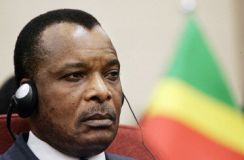AU failure: Congo’s Sassou is no better than Sudan’s al-Bashir
Jan 24, 2006 (JOHANNESBURG) — By rejecting Sudan’s bid to head the African Union, African presidents on Tuesday appeared to signal it was no longer business as usual for their peers tainted by poor human rights records.
 But the choice of unstable Congo Republic and its President Denis Sassou Nguesso, a former coupmaker and warlord, to lead the 53-nation group baffled many analysts.
But the choice of unstable Congo Republic and its President Denis Sassou Nguesso, a former coupmaker and warlord, to lead the 53-nation group baffled many analysts.
Faced with bitter internal conflict in Darfur and accusations of human rights abuse, Sudan’s President Omar al-Bashir bowed to pressure from civic groups and some African leaders to withdraw his candidature for the AU chair.
The seat went to Sassou, who becomes the spokesman for the world’s poorest continent as it tries to charm rich Western nations and win foreign investment, aid and a fairer trade deal.
Many were shocked by the decision to hand the chair to Congo Republic, a country they said had no real track record of democracy since independence from France in 1960. Its president had little clout with influential African leaders such as outgoing AU chairman Olusegun Obasanjo of Nigeria, they said.
“They are not an ideal candidate and the reasons you deny Sudan the chair apply also to Brazzaville,” said Siphamandla Zondi, Africa director at the Institute for Global Dialogue, a Johannesburg think-tank.
“That’s a surprise choice. Congo Republic doesn’t have the requisite authority to chair the AU, to lead in resolving Africa’s problems,” Zondi said.
“Hey, hey, that is a new one. I hadn’t thought of them,” said Willie Breytenbach, professor of political science at South Africa’s University of Stellenbosch.
Analysts argued that it was important to send a strong message to Sudan that unless it resolved its internal conflicts, improved its human rights record and promoted greater political freedom, it would not be Africa’s face on the global stage.
Sassou’s own democratic credentials are in doubt. He first became president of Congo Republic in 1979 after a military coup. He lost multiparty elections in 1992 but fought his way back to power after a brief civil war in 1997 in which Angolan troops and tanks helped his Cobra militia to victory.
Sassou legitimised his rule in a 2002 presidential poll he was guaranteed to win after his main challenger withdrew, citing an unfair electoral environment.
CREDIBILITY GAP
Analysts doubted that Sassou would be prepared to devote his time and Congo Republic’s oil resources to a campaign to end the continent’s many conflicts as Obasanjo had done.
Some analysts argued that the AU chair should give strategic direction to the organisation and push the continent’s agenda on the global stage. Sassou lacked the stature and credibility to perform either role.
The choice of Congo also suggested that the AU’s consensus decision-making made it difficult to reach ideal agreements on key issues. Analysts said the AU must urgently work out guidelines for selecting its future chairs.
But others said the burden of leading Africa could force Congo Republic to reflect on internal democratic reform, better protection of human rights, and the need to work for peace.
“Congo Republic has moved from civil war and is trying to stabilise. It is a much better choice than a country that has not been seen as the best example in democracy and human rights like Sudan,” said Eddy Maloka, executive director of Pretoria-based Africa Institute of South Africa.
“If we were very strict on the issues of democratic governance, rule of law and human rights, we wouldn’t find a candidate to chair the AU,” Maloka told Reuters.
But Ugandan political analyst Andrew Mwenda said the poor record of current AU members on human rights and good governance showed little had changed from 1975, when the then Organisation of African Unity elected Uganda’s dictator Idi Amin as chairman.
“The only issue AU leaders may have now with Sudan is that it has been getting some adverse publicity in the Western media over its killings in Darfur, but Congo is no better,” Mwenda told Reuters. “The AU is still largely a collection of corrupt and incompetent governments.”
(Reuters)
